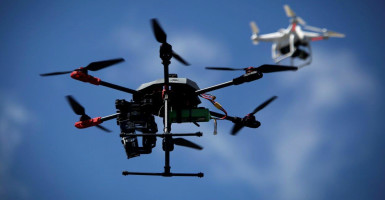Drones are flying off the shelf at a record pace. This holiday season, Americans are expected to buy 1 million drones. Drone manufacturers see sales measured in the billions.
Federal officials, however, see nothing but danger. They look at this year’s record number of reports of near-collisions between passenger jets and drones, the encroachment of drones on restricted airspace, and interference with aircraft battling wildfires.
In response, the Department of Transportation and the Federal Aviation Administration announced plans to require recreational drone owners to register their quadcopters with the federal government.
And you’ve got only until Nov. 6 to say anything about it.
Agency spokesmen claim unsafe drone flying is on an alarming rise, although prosecutions or civil judgments are rare because tying drones back to specific operators is quite difficult. We are told a drone registry finally will make it possible for law enforcement officers to find reckless drone pilots and hold them responsible.
How We Got Here
Federal law grants legal authority to the Federal Aviation Administration, or FAA, to regulate aircraft operating within the National Airspace System, including requiring pilot’s licenses and aircraft registration. Historically, the FAA has exempted model aircraft operated for hobby or recreational purposes from the registration requirement.
Now, transportation and aviation officials are reversing course. But rather than go through the tedious process of drafting a proposed rule, unveiling it to the public, and inviting comment, the FAA is skipping straight to the end. By Nov. 20, a registration task force consisting of experts and industry representatives will propose rules governing the registry to take effect shortly thereafter.
And those rules will include steep civil, and possibly criminal, penalties. The FAA has floated the possibility of civil fines up to $27,500, and criminal penalties up to $250,000 and three years’ imprisonment—merely for failing to register a drone.
The public, meanwhile, got only 15 days to comment on the registry—and that window, which closes Nov. 6, already is more than half over.
In some circumstances, federal law allows agencies to skip the normal notice-and-comment process when the public interest isn’t served by the much slower, deliberate pace of rulemaking. Yet, although the FAA is right that near-collisions with airliners and unauthorized drone flights near airports are inherently dangerous, these incidents have been documented for years.
Predicting that such incidents would increase in line with rising private drone ownership is hardly a logical leap. The FAA has had ample time to consider the problem and promulgate rules through the normal process. They failed to do so.
The agency’s own lack of foresight helped create the exigency they now cite to justify imposing new burdens on drone operators with little time for outside comment.
Some Basic Questions
The current situation is unacceptable, but the bureaucrats appear to have decided a registry is the preferred solution. They’ve done that without attempting to answer even the most basic questions such a program raises:
What drones will be required to be registered? When will registration be required, at the point of sale or before the drone’s first flight? Will the registry be retroactive?
How will drones be identified, by special markings such as aircraft tail numbers, or by the drone’s serial number? Do drones have identifying serial numbers suitable for the registry?
Finally, how should the registry address the burgeoning do-it-yourself enthusiasts, who build custom drones from scratch, or modify existing ones to fly further or stream live video feeds?
All these questions presume a registry will be an effective means of identifying drones piloted in restricted areas, or in a dangerous manner.
Perhaps when the drone itself is in the physical custody of law enforcement, it will be possible to pull identifying information and single out the operator. But for that to happen a drone would have to crash or otherwise be brought down. Most drone incursions end with an easy escape. In those situations, it isn’t clear how useful a registry actually will be.
No Justification for the Rush
The leap to a registry is a natural one for the FAA. It already requires registration of civilian aircraft and drones used for commercial purposes. Both of those registries rely on complicated, paper-based forms. A single filing can take months to process.
The feds say they want the registry of recreational drones to be electronic and “streamlined,” but have no model to base it on. After the Obamacare rollout debacle, it is at least debatable whether the federal government is capable of rolling out a functional, Web-based registration system—especially on a tight deadline.
After the hack of employment records at the Office of Personnel Management, it is equally questionable whether the government can secure the personal information it no doubt will demand of drone owners.
The FAA’s track record on drones is abysmal. Earlier this month, the agency blew through a congressionally mandated deadline to regulate commercial drone operations. That means that for the time being, drone use for businesses will continue to be illegal, absent what is called a Section 333 exemption.
And the “Section 333” exemption program forces individual companies to file complicated applications for exemptions, and sometimes leaves them waiting for months. To date, the FAA has granted only about 2,000 commercial exemptions.
In six years of trying to regulate commercial drones, the FAA has failed miserably. Now it purports to solve all the problems surrounding recreational drone registration within a month? Highly unlikely.
The Federal Aviation Administration and the Department of Transportation may have the best of intentions in promoting responsibility and safety among drone pilots. But that doesn’t justify rushing into a complicated regulatory scheme that is poorly thought out, may do little to solve the problem, and carries stiff civil and criminal penalties.



























